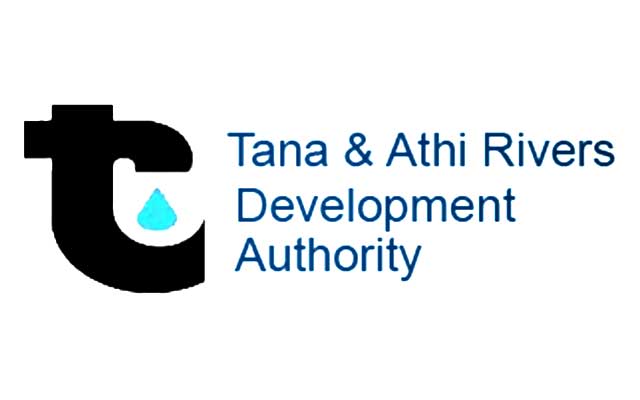CELEBRATING 50 YEARS OF TARDA’S LEGACY AND VISION: HARNESSING RIVERS FOR KENYA’S PROSPERITY
By Liban Roba
Since its inception in 1974, the Tana and Athi Rivers Development Authority (TARDA) has stood as a pillar of socio-economic growth and environmental stewardship in Kenya. Established during the nation’s formative years post-independence, TARDA was designed to usher Kenya into a new era—transforming subsistence livelihoods into a dynamic, industrialized economy. Today, it continues to play a critical role in integrated basin-based development across the Tana and Athi River basins, covering 19 counties and impacting nearly 20 million people.
TARDA’s origins are deeply intertwined with Kenya’s development aspirations outlined in the Sessional Paper No. 10 of 1965 on African Socialism. Inspired by global success stories such as the Tennessee Valley Authority in the U.S. and the Gezira Scheme in Sudan, TARDA was envisioned as a transformative force. Its mandate encompassed hydro-power generation, environmental conservation, natural resource management and rural economic development.
The vast watershed under TARDA’s jurisdiction spans approximately 138,000 square kilometers, representing a critical resource base for agriculture, energy, water supply and biodiversity. Over five decades later, TARDA has not only fulfilled its founding vision but has also evolved to address contemporary challenges, from climate change to food security.
TARDA’s contributions to Kenya’s development are profound and multifaceted. Through a combination of innovative projects and community-driven initiatives, TARDA has transformed landscapes and livelihoods. From the 1985 Tana River Morphology Study to the ambitious High Grand Falls Multipurpose Reservoir plans, TARDA’s research initiatives have provided the foundation for sustainable development. These studies have guided critical interventions in irrigation, hydropower and environmental conservation.
TARDA’s hallmark projects include the Masinga and Kiambere Dams, which collectively hold over 2 billion cubic meters of water. These reservoirs have not only enhanced water regulation and hydropower generation but have also supported domestic water supply for urban centers like Nairobi. Infrastructure projects such as roads and airstrips in Embu, Kitui and Machakos counties have further facilitated connectivity and economic activity.
Agriculture remains at the heart of TARDA’s mission. By establishing irrigation schemes across counties like Tharaka-Nithi, Kirinyaga and Meru, TARDA has boosted food production and supported smallholder farmers. Projects such as the Kibwezi Irrigation Project and the Tana Delta Irrigation Project have empowered communities through technology transfer and sustainable farming practices.
In the face of deforestation, erosion and climate change, TARDA has prioritized reforestation and catchment management. Initiatives such as planting over 2 million seedlings annually and creating green belts around reservoirs demonstrate its commitment to preserving ecosystems. TARDA’s innovative approach integrates community income-generating activities such as fisheries and honey production, fostering environmental stewardship while improving livelihoods.
Water scarcity and droughts pose significant challenges, particularly in arid regions. TARDA’s drought mitigation programs, including the construction of boreholes, small dams and water pans, have benefitted thousands of households and livestock. These efforts align with Kenya’s Bottom-up Economic Transformation Agenda (BETA), aiming to build resilient communities through water security.
Looking ahead, TARDA is strategically positioned to continue driving Kenya’s development through integrated water resource management, environmental sustainability and community empowerment. TARDA is expanding irrigated agriculture, livestock development, smallholder projects and community training that will further enhance productivity and economic resilience.
The Upper Tana and Athi River Basins face growing challenges, including pollution and deforestation. TARDA’s initiatives focus on restoring sub-catchments, afforestation and promoting sustainable land use. Collaborations with county governments and academic institutions aim to address these issues through data-driven interventions.
TARDA’s integrated river basin plans emphasize resource mapping, pollution control and stakeholder engagement. By incorporating climate-smart practices, TARDA is ensuring the sustainable use of natural resources for future generations.
Through partnerships with various local, regional and international agencies, TARDA is leveraging technology and expertise to optimize its impact. These collaborations underscore TARDA’s role as a trusted advisor to the Government on water resource management and basin-based planning.
As we celebrate TARDA’s remarkable achievements, we are reminded of its enduring mission: to harness the potential of the Tana and Athi Rivers for the socio-economic transformation of Kenya. TARDA’s journey is a testament to the power of visionary leadership, community collaboration and sustainable development.
Kenya’s future is inextricably linked to the health of its natural resources and the resilience of its people. TARDA’s ongoing efforts to integrate environmental conservation, economic growth and social equity offer a blueprint for a sustainable and prosperous nation.
As we chart the way forward for TARDA’s bold vision, we’re keen on ensuring that the rivers it stewards continue to flow as lifelines for Kenya’s present and future generations.
Mr. Liban Roba is the Managing Director of the Tana and Athi Rivers Development Authority (TARDA)

